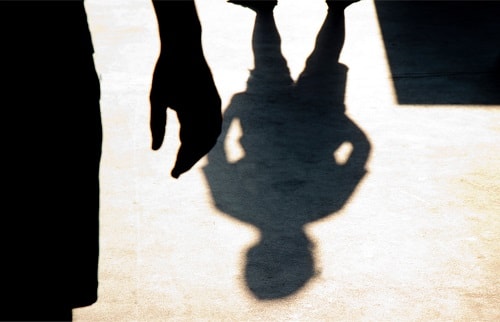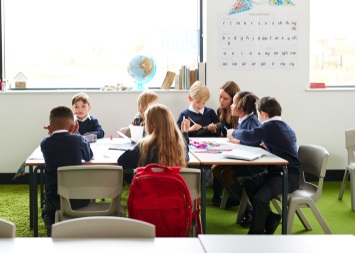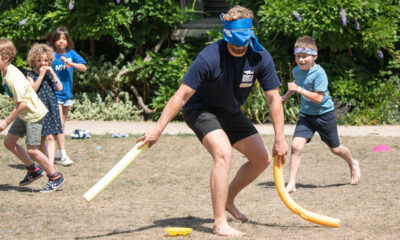Advice
What happens to the kids?

The authoritarian parenting style is about being strict and stern. Authoritarian parents insist on unquestioning obedience, and enforce rules through psychological control — threats, shaming, and other punishments.
As defined by psychologists, it’s also a style associated with relatively little parental warmth and responsiveness (Baumrind 1991).


That doesn’t bode well for children’s health outcomes, especially in stressful environments. As I note elsewhere, warmth and responsiveness can protect kids from the effects of toxic stress.
But what about other outcomes?
Are the children of authoritarian parents well-adjusted? Do they get along with others? Do they excel in school? If authoritarian parents are demanding, shouldn’t their children be better-behaved and more successful in the classroom?
It sounds plausible, but of course we need some context. Better-behaved and more successful compared with what? Typically, researchers compare authoritarian parenting with two other styles:
- permissive parenting, in which parents are emotionally warm, but reluctant to enforce rules or standards of conduct; and
- authoritative parenting, in which parents set limits and enforce standards, but also show high levels of warmth and responsiveness.
Note that “authoritative” parenting goes by a label that sounds deceptively similar to “authoritarian”. But the contrast is stark, and it isn’t only because authoritative parents show more warmth.
Unlike authoritarian parents, authoriative parents encourage their children to ask questions, and they explain the rationale behind the rules. In addition, authoritative parents avoid controlling their kids through the induction of shame, guilt, or the withdrawal of love.
So — with these alternatives in mind — how does authoritarianism measure up?
Evidence that authoritarian parenting makes behavior problems worse
When kids have really difficult behavior problems, it might seem that the only remedy is severe disciple — to control children through threats, harsh punishments, or shaming. But research suggests these tactics don’t result in long-term behavioral improvements. On the contrary, they seem to make things worse.
For instance, let’s consider what psychologists call “externalizing problems” — disruptive, aggressive, defiant, or anti-social behavior.
If authoritarian disciplinary tactics were effective, we would expect them to lead to fewer such behavior problems as children get older.
But that isn’t what we observe when we track children’s development.
In a meta-analysis of more than 1400 published studies, Martin Pinquart found that harsh discipline and psychological control were actually the biggest predictors of a child’s behavior worsening over time (Pinquart 2017). Kids subjected to authoritarian tactics at one time point tended to develop more externalizing behavior problems at later time points.
Why? We can’t assume it’s entirely due to authoritarian parenting. Maybe genetic factors are partly to blame.
After all, we know that genetic factors can raise a child’s risk of developing certain kinds of behavior problems, and such kids may tend to provoke authoritarian responses from their caregivers. Parents see their children misbehaving, and they struggle to find a solution. They feel stressed and frustrated. They crack down with harsh discipline — threats and punishments — and show less warmth toward their misbehaving children.
It’s a scenario where behavior problems and authoritarian parenting are linked, but not necessarily because authoritarian parenting causes behavior problems. Instead, the kids themselves are part of the story. Their misbehavior triggers authoritarian responses.
So how do we find out what’s really going on?
When researchers have tried to tease apart causation, they’ve confirmed that children’s pre-existing behavior problems can indeed provoke authoritarian reactions from parents.
When children display lots of anger, it increases the likelihood that their parents will respond with hostility (Shewark et al 2021). When kids tend to be more impulsive for their age — or unusually withdrawn — parents are at higher risk for adopting harsh practices (Reiss et al 2022).
But there is also evidence that authoritarianism is harmful. It appears to make children’s behavior problems worse.
For example, in a behavioral genetics study of twins, Rebecca Waller and her colleagues focused on kids with “callous unemotional traits” — traits that like low empathy and poor moral self-regulation (Waller et al 2018).
These traits are linked with serious behavior problems, and Waller’s team confirmed that genes matter. Some kids were at higher genetic risk for developing “callous unemotional traits.”
Nevertheless, parenting style also had an effect. When parents showed children lots of warmth and affection, kids were less likely to develop callous unemotional traits. Even kids who were at high genetic risk showed fewer symptoms.
What about the development of social skills? Does authoritarianism help or hurt?
It’s hard to know if authoritarian parenting causes children to develop differently. But when researchers compare different parenting styles, they’ve found that authoritarian parenting is linked with lower social competence (Steinberg et al 1994; Chen et al 1997; Zhou et al 2004; Martinez et al 2007; Garcia and Gracia 2009; Garcia et al 2020).
To see what I mean, consider an interesting study conducted in China on links between authoritarianism and children’s peer relationships.
Study: How authoritian parenting sets up young children for failed connections with peers
Dexian Li and colleagues wanted to know how authoritarian caregiving at home might affect a young child’s social functioning at school. So the researchers distributed questionnaires to parents and teachers. There were more than 2300 kids targeted — children between the ages of 3 and 6.
As it turned out, kids raised by authoritarian parents were rated by their teachers as being less socially competent with their peers. For example, teachers were less likely to agree that these kids could “…organize a group of their peers to work collaboratively in the classroom” (Li et al 2024).
The effect wasn’t large, but for certain types of kids it explained nearly 30% of the variation in peer competence among children. Boys, younger children, and kids without siblings were impacted the most by authoritarian caregiving.
Why might authoritarian parenting undermine the development of social competence?
The authors of the Chinese study discuss a couple of interesting, related explanations.
When kids are raised by authoritarian caregivers, their experiences may prompt them to develop a hostile attribution bias — a tendency to assume that other people have aggressive or antagonistic intentions. At the same time, these kids kids lack role models — and explicit instruction — for learning healthy, effective strategies for coping with their negative emotions.
Put these factors together, and kids could end up responding in one of two ways — either lashing out against social norms, or becoming socially withdrawn. And both responses will tend to undermine the development of healthy peer relationships (Li et al 2024).
Other research supports the idea that kids exposed to authoritarianism are less likely to learn socially-relevant skills
For example, empathy helps us identify the intentions and needs of others, and there’s reason to think that kids raised by authoritarian parents develop less empathy. There’s also evidence that these kids have less to offer as social partners — i.e., that they lack characteristics that would make them desirable friends or allies.
In a study of more than 2500 adults and adolescents living in Spain, folks who identified their parents as authoritarian tended to score lower on empathy (Martinez-Escudero et al 2020). Similarly, a study of 87 preschoolers in China found that empathy scores were substantially lower among kids with authoritarian parents. They were also more aggressive (Lin et al 2023).
Meanwhile, in the Netherlands, kids with authoritarian parents were rated as less helpful and less popular by their teachers and classmates. They were also rated as less mature in their reasoning about moral issues (Dekovic and Jannsens 1992; Jannsens and Dekovic 1997).
In harmony with these results, a study of American teenagers found that kids with authoritarian mothers were less likely to have internalized moral values relating to social contracts — such as the importance of keeping promises, and rescuing a friend in dire trouble (Bornstein et al 2022).
And other studies conducted in the United States suggest that adolescents feel lower levels of social acceptance from their peers when they are raised by authoritarian parents (Lamborn et al 1991; Steinberg et al 1992; Steinberg et al 1994).
Is there any connection between authoritarian parenting and bullying?
Yes. Numerous studies — conducted in a variety of cultural settings — suggest that kids are at higher risk for involvement in bullying if their parents use authoritarian tactics or attempt to control them through the use of punitive discipline (Georgiou et al 2013; Luk et al 2016; Krisana et al 2019; Martínez-Ferrer et al 2019; Zurcher et al 2018; Gómez-Ortiz et al 2016).
What about links between authoritarian parenting and emotional problems?
Does authoritarianism put kids at greater risk of emotional problems? It might.
In places as diverse as Germany, the Caribbean, China, Taiwan, and the United States, researchers have noticed links between authoritarian parenting and emotional troubles — including childhood anxiety, symptoms of depression, and poor self-regulation (Azman et al 2012; Wolfradt et al 2003; King et al 2016; Lipps et al 2012; Chang 2003; Wang et al 2006; Gan et al 2021; Huang et al 2019; Gan et al 2021).
Moreover, researchers in Latin cultures have recorded lower levels of self-esteem among adolescents from authoritarian homes (Martinez et al 2020; Queiroz et al 2020), and the effects may linger into adulthhood: Spanish adults report less happiness and life satisfaction if they were raised by strict, authoritarian parents (Garcia et al 2020).
Are children’s emotional outcomes simply determined by shared genetics? No.
Maybe authoritarian parents tend to be at higher genetic risk for developing emotional problems, and their kids inherit those same genes. But there’s evidence against this as the primary explanation.
For example, in a behavioral genetics study of Chinese twins, researchers found that kids with authoritarian fathers were more likely to suffer from a psychiatric disorder — even after accounting for the influence of genes (Yin et al 2016).
Similarly, a behavioral genetics study conducted in the United States suggests that authoritarian parenting puts kids at higher risk for experiencing major depression during adulthood (Long et al 2015).
And what about situations where caregivers and children aren’t genetically related?
If children’s emotional problems merely reflected genetic risk factors they share with their authoritarian caregivers, then we wouldn’t expect to see these links in families where individuals aren’t genetically related. For example, we’d predict that kids from foster families would be equally likely to develop emotional troubles — whether or not their foster parents use authoritarian tactics.
But that’s not what the research tells us. In a meta-analysis of 31 studies on the development of foster children, investigators found that kids were more likely to end up with emotional problems if their foster parents took an authoritarian approach to discipline (Chodura et al 2021).
Nevertheless, it’s worth noting: The authoritarian parenting style isn’t always linked with emotional problems
Some studies of American adolescents have failed to find emotional differences between kids from authoritarian, authoritative, and permissive homes (Lamborn et al 1991; Steinberg et al 2006). And research on adolescents in the Middle East has also failed to find a link between authoritarian care-giving and psychological problems like depression (Dwairy 2004; Dwairy and Menshar 2006).
Why the inconsistencies? I suspect the effects of authoritarianism depend on how harsh, cold, or punitive the parent is. For instance, as I noted in my article about spanking, research suggests that corporal punishment is linked with higher rates of depression and anxiety among children. Maybe some forms of authoritarian parenting are more intense — more negatively impactful — than others.
It also seems likely that culture plays a role. If kids perceive authoritarianism as normal and mainstream, they may be less distressed by it (Dwairy 2004). Consistent with this idea, in societies where it’s normative for parents to exert lots of psychological control, links between parental control and poor emotional outcomes are weaker (Lansford et al 2018).
How do children from authoritarian homes perform academically?


Several lines of evidence suggest that authoritarianism puts children at an academic disadvantage. Here are some of them.
Experimental research suggests that authoritarian approaches interfere with learning
In a fascinating study of kindergartners, Melissa Kamins and Carol Dweck have shown that a common tactic of authoritarian care-giving —
-

 Destination8 months ago
Destination8 months agoSingapore Airlines CEO set to join board of Air India, BA News, BA
-

 Breaking News10 months ago
Breaking News10 months agoCroatia to reintroduce compulsory military draft as regional tensions soar
-

 Gadgets3 months ago
Gadgets3 months agoSupernatural Season 16 Revival News, Cast, Plot and Release Date
-

 Tech News12 months ago
Tech News12 months agoBangladeshi police agents accused of selling citizens’ personal information on Telegram
-

 Productivity11 months ago
Productivity11 months agoHow Your Contact Center Can Become A Customer Engagement Center
-

 Gadgets3 weeks ago
Gadgets3 weeks agoFallout Season 2 Potential Release Date, Cast, Plot and News
-

 Breaking News10 months ago
Breaking News10 months agoBangladesh crisis: Refaat Ahmed sworn in as Bangladesh’s new chief justice
-

 Toys12 months ago
Toys12 months ago15 of the Best Trike & Tricycles Mums Recommend























